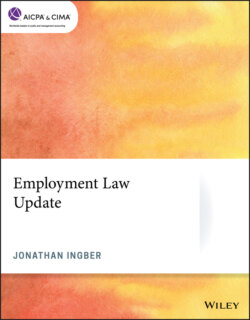Читать книгу Employment Law Update - Jonathan Ingber - Страница 48
What about after-hours GPS tracking?
ОглавлениеIf an employer uses a tracking system that continues to record the location of the device or car after work hours, the employer will be exposed to potential invasion of privacy claims or claims that a termination was wrongful because it was based on the employee's off-duty conduct. In a general sense, this type of tracking is similar to tracking the location of noncompany property. Any time an employer tracks noncompany property using GPS, privacy concerns will immediately be raised.
In one 2015 California suit, Arias v. Intermex Wire Transfer, a saleswoman sought economic damages of over $500,000 and unspecified punitive damages against her former employer for wrongful termination and invasion of privacy. Intermex had asked its employees to download a GPS tracking app to their personal smartphones so that the company could monitor their locations. Ms. Arias did so, but allegedly expressed concern that location tracking could occur after business hours. A regional vice president allegedly acknowledged that tracking could take place after work hours and allegedly said that Ms. Arias was required to keep her phone on “24/7” so she could answer calls from clients. The suit alleged that the vice president and perhaps others had tracked Ms. Arias's location after work hours.
Ms. Arias was fired a few weeks after removing the app from her smartphone. The suit later settled for an undisclosed amount. The bottom line: employers should never monitor employee locations after work hours and should ensure that monitoring programs or apps are deactivated after work hours — otherwise, they are at risk of a suit like Arias v. Intermex Wire Transfer.4
